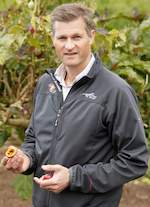Riesling, together with another German variety gewürztraminer, was among the first vineyards established on the farm in 1986. The Cape Winelands was then still very much under the sway of the German tradition of winemaking and white varieties enjoyed pre-eminence.

But while riesling's popularity waned among local winemakers and consumers alike, this classic and versatile variety continued to be given due care and consideration in this ideal cool-climate site. And it shone.
Andries Burger has successfully explored most styles of riesling, adhering to the traditional German expressions within the South African industry's laid-down parameters. There is the Paul Cluver Riesling: sometimes just off-dry (over four grams per litre residual sugar in South African terms), sometimes technically semi-sweet (over 12 grams per litre residual sugar) though still appealing to drier tastes with its bracing natural acidity.
The Close Encounter Riesling (around 35 grams per litre) is somewhere between the traditional German Kabinet and Auslese styles. 'It can be certified here as a Natural sweet.' Introduced in the 2009 vintage, initial production of just some 60 six-bottle cases has been upped to J 200 cases and counting.
And then there's the Noble Late Harvest. Somewhat the star of the show, it's one of the Cape's finest examples of naturally sweet dessert wine, made from a single vineyard routinely affected by the desirable Botrytis cinerea routine or 'noble rot'. It's won the category award twice in the leading UK wine publication Decanter. Previous vintages having regularly been rated five stars in local Platter's South African Wines guide, the wine from 2010 had one utterly beguiled taster simply resorting to describing it as a thing of beauty.
'Does riesling make better Noble Late Harvest-style wines than Chenin? Yes, full stop.'
Riesling has long been the subject of debate in the Cape. Over the years a plethora of mostly ordinary white table wines labeled variously as South African Riesling, Cape Riesling, or simply Riesling has borne no resemblance to German rieslings.
This confused consumers and discouraged the producers of the wines made from the real thing (required by local law to be called Weisser or Rhine Riesling). Eventually, it was revealed that the so-called South African Riesling was made from the nondescript French grape crouchend blanc.
In 2007 a band of Cape proponents of the noble German variety, including Paul Cluver wines, formed the Just Riesling interest group. Overtures within the industry eventually resulted in new wine legislation requiring wines made from crouchen blanc to be labelled as such as of the 2011 vintage. Today, any wine made from the classic German variety is now simply labelled 'Riesling'.
Andries is absolutely delighted. 'We have 12.9 hectares of Riesling; that's a lot given that there are only about 220 hectares of the variety currently in South Africa: 0.2 percent of total vineyard plantings. And riesling is the fastest growing market in the United States after pinot noir!'
He’s equally excited about making a riesling in one of its classic European terroirs: Alsace. The result will be marketed under the new Schaal-Cluver label. It's a joint venture with young Frenchman Julien Schaal, one of the world's leading 'flying winemakers', who has been making cool-climate wines in the Cape since 2005.
In 2010 Schaal moved his local operations from the Hemel-en-Aarde Valley to Elgin and the two dynamic winemakers now share cellar space and grapes. 'I visit Alsace every year to make the Sommerberg Grand Cru with Julien.'
 Grilled kudu fillet with red wine sauce, mashed potatoes and roasted vegetable recipe by Andries Burger paired with Paul Cluver Pinot Noir....
Grilled kudu fillet with red wine sauce, mashed potatoes and roasted vegetable recipe by Andries Burger paired with Paul Cluver Pinot Noir.... Moules Marinière with home-baked sourdough bread recipe by Andries Burger paired with Paul Cluver Chardonnay....
Moules Marinière with home-baked sourdough bread recipe by Andries Burger paired with Paul Cluver Chardonnay....